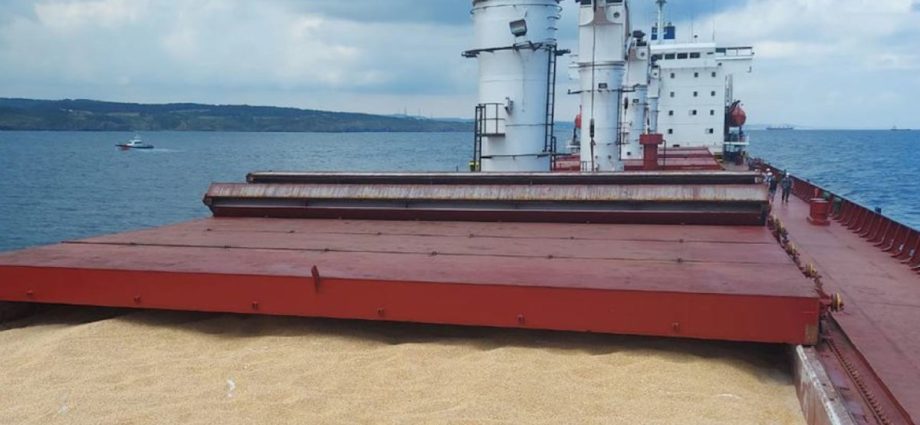
Russia’s recent decision to suspend participation in the Black Sea Grain Initiative, a UN-backed agreement that has allowed Ukraine to export food during the ongoing conflict, will have repercussions that go beyond threatening global food security.
It could also rewrite the region’s political map.
In the eyes of many Russian propagandists, the grain-deal reversal is payback for humiliation levied by Turkey on July 7, when President Recep Tayyip Erdogan repatriated five captured Ukrainian commanders.
The fighters had spent several months in a secure facility in Turkey after surrendering to Russian troops in the port city of Mariupol last year. The soldiers were part of the Azov Regiment, which Russia considers a terrorist organization and which has been accused of harboring neo-Nazi and white supremacist ideology.
From the Russian perspective, Erdogan’s decision to send the men home was a slap in the face. If Russia had extended its participation in the grain deal, which uses Turkey as a transit hub, Putin would have looked even weaker, the thinking goes.
Russia’s withdrawal from the deal doesn’t mean the Kremlin is ready to reimpose another full blockade of the Black Sea, as it did at the beginning of the war, or that it plans to jeopardize its relations with Ankara. However, there is no doubt that one of the major goals of Russia’s recent missile strikes on Ukrainian ports is to prevent, at least temporarily, the country from exporting its grains.
Despite having different views on the UN-supported initiative, Putin and Erdogan remain “friends,” according to the Turkish leader. Putin is expected to visit Turkey in August, and the grain initiative will be high on the agenda. Although Russia has shown its hand, Erdogan insists that Putin is interested in a continuation of the agreement.
What any new deal might look like remains unclear. Russian officials claim that Turkey will have to purchase Russian grain “at normal world prices.” Ankara, on the other hand, hopes to continue buying both Russian and Ukrainian grain at discounted prices.
And yet because Erdogan seems to have the upper hand, it’s conceivable that Putin will have to accept Turkish conditions. Failure to do so could be costly for Moscow.
For one, Ankara could in effect close the Bosporus and Dardanelles straits to the Russian navy and civilian ships headed to Syria, complicating Russia’s engagement in the Middle Eastern country.
Russian energy companies involved in multibillion-dollar projects in Turkey could also be squeezed. Rosatom, which is building a nuclear power plant in southern Turkey’s Mersin province, and Gazprom, which seeks to turn Turkey into a gas hub, would almost certainly pressure the Kremlin not to anger their Turkish counterparts.
Barring that, Turkish authorities could follow the West and impose sanctions on Russian oligarchs who have found safe haven in their country.
Turkey and Ukraine might even start implementing a grain deal without Russia’s participation, which would represent another humiliation for Moscow. Under this scenario, Ukraine could simply continue exporting its grains to Turkey, ignoring Russia’s threats.
Along these lines, Ukrainian President Volodymyr Zelensky recently called on Erdogan and UN Secretary General Antonio Guterres to support grain shipments without Russian involvement.
Kiev and Ankara understand that the Kremlin is unlikely to dare sinking Ukrainian or Turkish civilian ships, as such an action could lead to direct Turkish involvement in the Ukraine war. Thus Ukraine and Turkey could simply continue doing grain business as usual.
However, if Moscow decides to escalate, and really starts attacking ships going to or from Ukrainian ports, Kiev will almost certainly respond. As a last resort, Turkey could even start supplying Ukraine with weapons via the Black Sea route, which would represent another blow to Putin and his war effort.
To avoid any of these outcomes, the Kremlin may have no choice but to take Ankara’s steer. Its propaganda machine could always spin Moscow’s policy as another “goodwill gesture,” with the goal of helping poor countries in Africa.
Erdogan might even insist that Moscow continue sending free grain to nations such as Mali, Djibouti, Sudan and Somalia – places where Turkey has been trying to increase its influence.
The fact that Turkey’s combat-drone producer Baykar has begun building a plant in Ukraine clearly indicates that Erdogan feels self-confident and doesn’t see Russia as a threat to Turkish interests. He knows that if Turkey is at the table, Putin’s room for political (and even military) maneuvering is limited.
For now, Turkey is in the driver’s seat. Erdogan won’t hesitate to push Putin to reach a new grain deal that saves Ankara money, and keeps the world fed. Moscow’s move might appear strategic, but in reality, it’s a desperate ploy by a leader quickly running out of options.
This article was provided by Syndication Bureau, which holds copyright.
Follow this writer on Twitter @nikola_mikovic.

